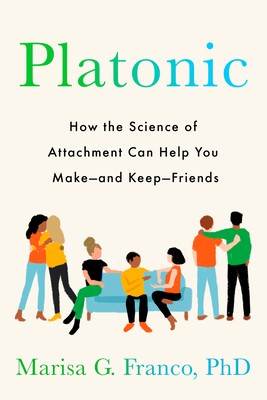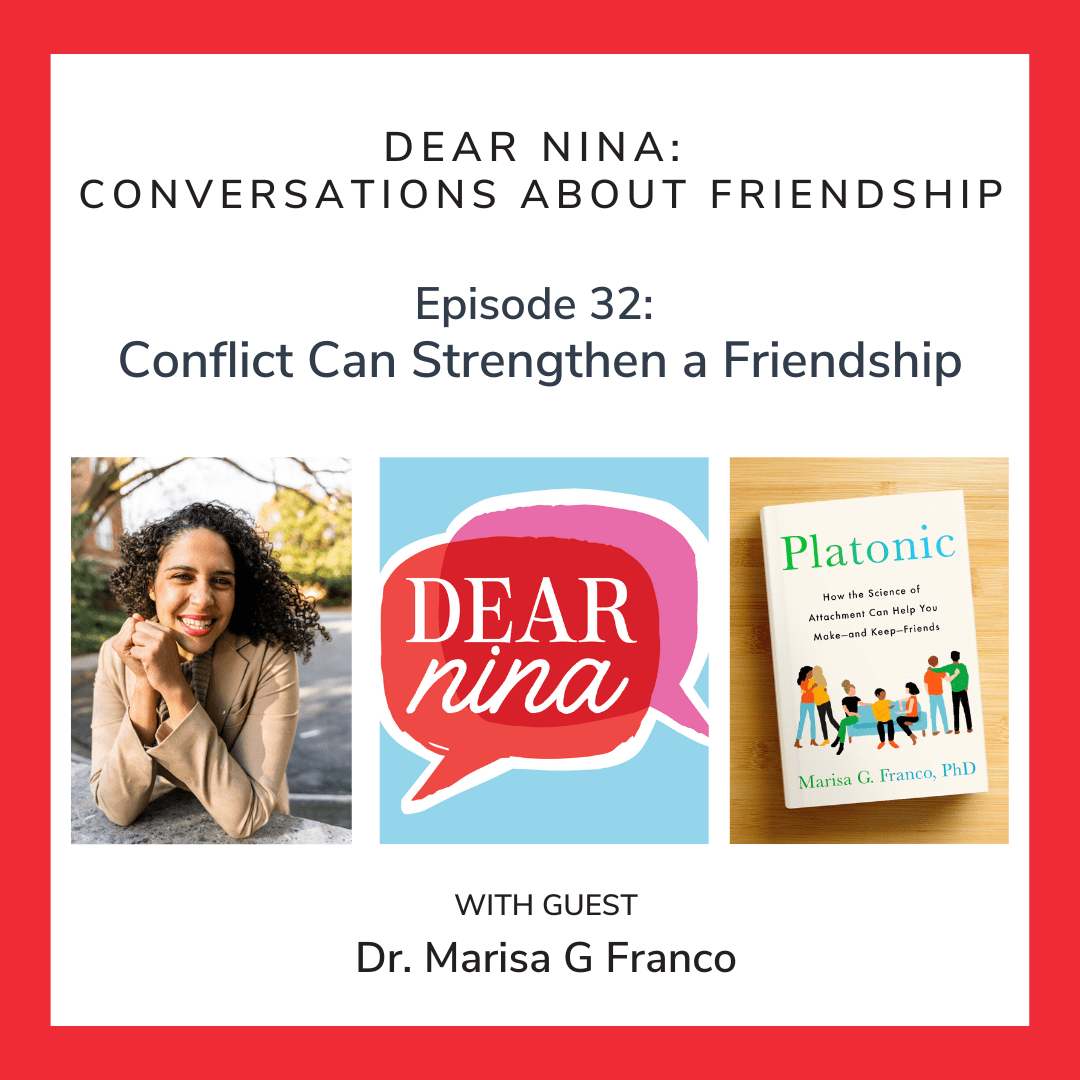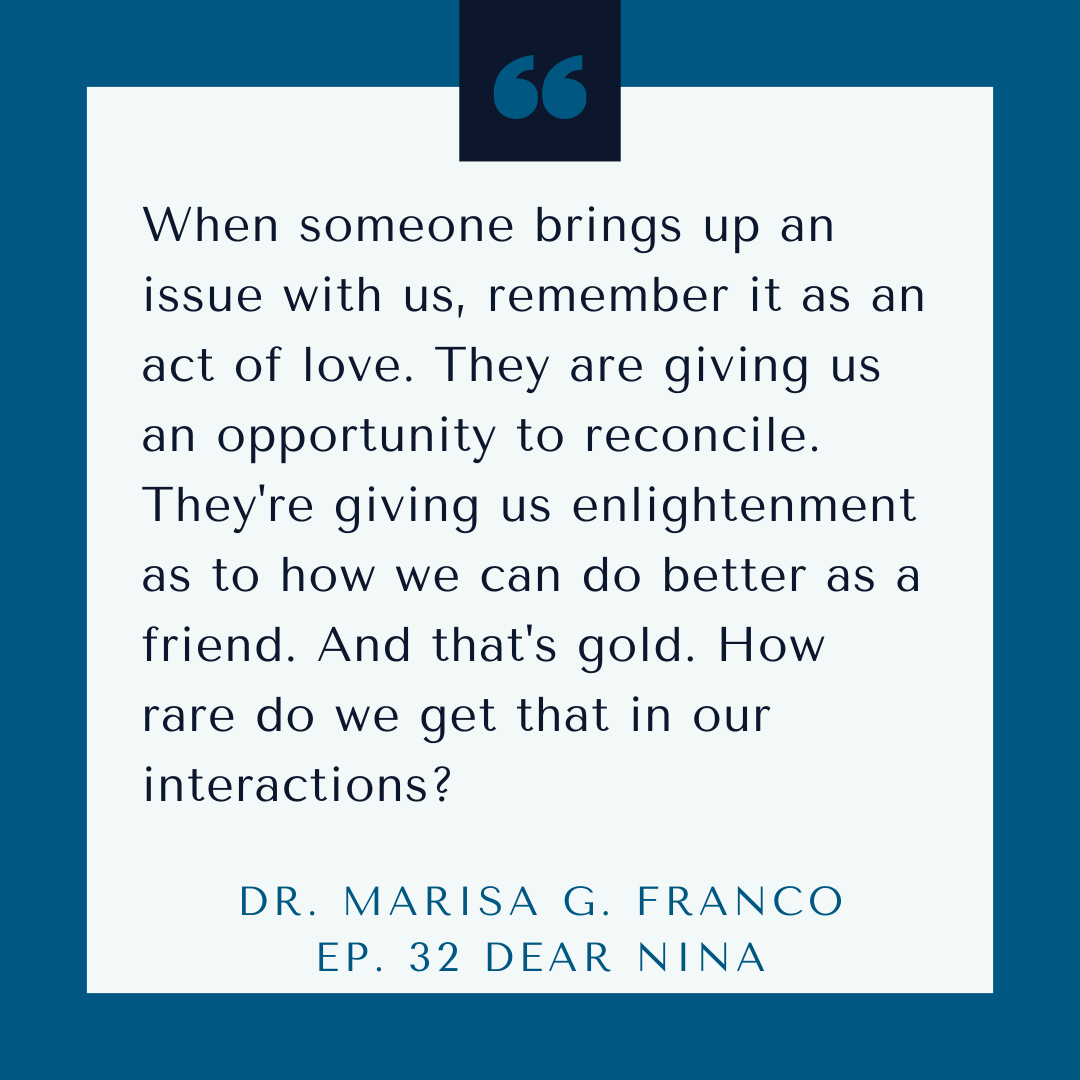Welcome to another episode of Dear Nina: Conversations About Friendship. I’m your host, Nina Badzin. In this episode Dr. Marisa G. Franco, NYT bestselling author of Platonic, and I talk about how expressing anger can strengthen a friendship. Dr. Franco also gives tips for how conflict between friends can have a win-win outcome. We talk about attachment theory in friendship and more.
MEET DR. MARISA G. FRANCO

On her Instagram (DrMarisaGFranco), you can find more friendship tips, and on her website, www.DrMarisaGFranco.com, you can find a free quiz to assess your strengths and weaknesses as a friend.
Read an excerpt of Platonic at The Atlantic.
FIND EPISODE #32 ON APPLE PODCASTS, SPOTIFY, OR ANYWHERE YOU LIKE TO LISTEN TO PODCASTS!
Highlights from my conversations with Marisa
Marisa on attachment theory:
Attachment theory is typically applied to romance, but our attachment style is really our internal template for how other people are responding to us and seeing us, which thus affects how we then behave in our relationships. Because most of what goes on into our friendships, our relationships, is ambiguous, we don’t actually know if someone meant to harm us, is being malicious, or is being nice. We don’t know if someone hasn’t texted us back because they hate us, or because they’re busy. Our attachment style tends to be the deciding factor in how we determine what’s going on in our relationships.
And so really there’s these three ways, actually four, but the fourth one there’s less research–that might interpret our relationships. Anxiously attached people always think people are abandoning them. So if you don’t text them back, they’ll think you hate them rather than you’re busy. If you bring up an issue with them, they might think you’re ending the friendship rather than you’re trying to solve an issue and reconcile with them. If you haven’t talked to them in a while, they might assume the friendship is over. Rather than that it’s just been sleeping for a little bit.
Avoidant attached people tend to think other people are untrustworthy and really value their independence. They’re often not very vulnerable. They lose friends easily. They don’t really try to make friends. They see relationships for their liabilities, their responsibilities, instead of for their benefits. So they just keep other people at a distance.
Secure people are comfortable giving and receiving love and getting close to people, and they tend to relate to ambiguity with optimism. They assume people like them. If they haven’t heard back from someone, they assume we’re still friends– they just haven’t had the chance to get back to me.
Marisa on not running from conflict:
I cite some research in the book that when it comes to conflict, we’re more likely to address it in our romantic relationships than in our friendships. And I think one of the themes that’s come up as I’ve written this book is what makes one relationship work makes another work. If you couldn’t be in a romantic relationship with someone without eventually addressing or confronting some sort of issue, that’s gonna be true for the intimacy of friendships. I think we have to normalize conflict as part of intimacy, rather than a red flag that a relationship needs to end or an excuse to just withdraw and back away, which is what we tend to do when we have issues with friends. . .
We need to use anger as a symbol that we need to heal something, rather than just push it away. Because what happens when we push it away is that there were so many junctures where we could have healed something and we didn’t, and then it gets to be too much. We’ve accumulated too many grudges. And at that point, all we feel like we can really do is withdraw from the friendship. And that’s why expressing our anger in a certain type of way is really a portal to healing the friendship. . .
“Having open conflict can benefit my friendships.” ~ Dr. Marisa G. Franco
Not addressing conflict is like holding someone guilty before you’ve given them a trial. Sometimes the conflict, the issue you had–they have a brilliant justification that would totally change how you interpret the harm if you only knew, if you only gave them a chance to explain themselves. So reading a study that was like, apparently if you address conflict in an empathic way, that is correlated with more intimacy in your friendship. And I was like, huh. So having open conflict can benefit my friendships. . .
The HOW of expressing anger to a friend:
This open empathic conflict looks like not blaming people, assuming positive intent, expressing what your needs are, taking their perspective while also considering your own. It doesn’t look like, I’m about to tell you about yourself and you sit down and listen.
The first is really just to soothe yourself, because anger, while it’s very valuable in that it tells us there’s an issue we need to address, if we embody the emotion of anger, we are low in perspective taking, we tend to just think about protecting ourselves and not protecting our relationship.
So you wanna take some time to process and sit with that anger, meditate, exercise, talk to someone else about the problem. Whatever can bring you to a place where you feel calm enough to come to the conversation in a way that you’re thinking about them. And you’re thinking about you and you’re trying to deescalate, and you’re trying to understand and offer empathy and empathize with yourself.
So that’s really important that pause. Framing is really important. So that’s the first touch that you have about the conflict. You wanna frame the conflict as an act of love, which helps your friend from going into fight or flight mode. So you say something like, hey, our friendship’s so important to me. So I just wanted to make sure we could talk about something that’s weighing on me so it doesn’t create any distance between us–something very loving, and you arrange a time to talk about it. And once you meet up with them, you wanna share how the problem is impacting you. You don’t wanna tell them about themselves and how they’re a bad friend. . . and you also want to ask for their perspective, because again, in hearing what’s going on for them, it can fundamentally change how things are sitting with you.
So you want then say, I was just wondering, what’s going on for you when you need to cancel last minute, for example. Is there something else going on that I may not be privy to? And maybe they’re like, actually I’ve been really depressed and I don’t really know if I’m going to have the energy to get out of bed and that’s going to give you the empathy, the explanation you need. And you’re going to realize, oh, this wasn’t a malicious thing.
Reminder that conflict is a challege:
I think you should know that conflict in friendship is hard. People are not used to it, so often friends will think you’re attacking them, even if you’re not, even if you use all these tips. So one thing I say is really important is being able to deescalate.
You hear your friend escalating, you bring it back down. If they’re telling you, well, you need to know about yourself. You do this, this, and this–you’re not counter attacking. You’re just saying, okay, I hear that you have some other issues maybe that we should also talk through about how I’ve been treating you. And I’d love to hear about those, but maybe we can focus on this part and then I want to hear you out on what some of your issues are. . . I talk about de-escalating as splitting into two selves. You’ll see the part of yourself that wants to fight back and you have to picture yourself splitting into two selves so you can kind of watch that part. And then instead, strategically meet your goal, which is healing the friendship, not punishing someone or blaming or having a big fight, right? So stay close and connected to that goal.
Part of my response:
The goal is always to heal the friendship. And if that’s not your goal, well, then why bother. An expression in your bookI really liked–It’s breakup or open up. Those are kind of the two choices. Are we breaking up this friendship or is this an opportunity to open up–open up how you’re feeling and let the other person open up.
Marisa on receiving anger:
When someone brings up an issue with us, remember it as an act of love. They are giving us an opportunity to reconcile and to heal things. They’re giving us enlightenment as to how we can do better as a friend. And that’s gold. How rare do we get that in our interactions? And if we can remember, in a larger way, this is really going to help me grow as a person, even if it hurts in the moment, I think that can be helpful with making us less defensive.
Let’s connect over all things friendship!
My Substack newsletter about friendship & more
A guide to pitching yourself as a guest
Instagram , TikTok, Twitter, Youtube, Threads
JOIN the Dear Nina Facebook group
Latest posts by Nina Badzin (see all)
- #151 – Myths Around Adult Friendships - June 16, 2025
- #150 – Join or Die: Pickleball, Potlucks, Democracy, and Your Health - June 10, 2025
- #149 – June Friendship Challenge: Ask a Friend For a Favor - June 1, 2025
- #148 – Tricky Friendship Etiquette for the Modern Age - May 26, 2025



